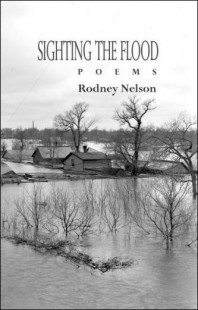
|
WHISTLING SHADE |

Dallas Crow’s first chapbook, Small, Imperfect Paradise (Parallel Press), is laid out like a time line of the poet’s life. Beginning with adolescent angst and Springsteen epigraphs, the poems quickly grow literary legs, and by page 9 are alluding to Hamlet and Prufrock in a Wallace Stevens parody titled “The Emperor of In Between.” Then follows some clever poetic exercises (a tritina, a villanelle, a meditation on gravity) and a tribute to a student; the poet has become (no surprise here) a high school English teacher.
But beginning with the title piece, Small, Imperfect Paradise dives into the dark whirlpool of a broken marriage and becomes an unlikely page-turner. Poems like “Separated”, “Divorce” and “Regret” are the sign posts across this bleak terrain; by the time we get to “Banquo on Horseback” we know all to well how to interpret the lines “Lady Macdeath paints a fair smile / upon her face each foul dawn.” Still we read on, grasping at hints of a new love, hoping the poet can pull himself together again.
“Today I’m feeling very Frank O’Hara in my new chartreuse shirt,” Crow informs us at the end of Small, Imperfect Paradise. Hopefully flippant as that sounds, I can’t shake the feeling that everything in Paradise is preordained, from the first lines of the first poem (“Pragmatism”):
Bold as a Union 76 sign, the moon
rises over the state line...
There are no gods in the Midwest,
only rough-hewn idols
forged from what we could salvage
Speaking of the Midwest—the poet Philip Dacey has recently moved back here from Manhattan, and is celebrating with a new collection, Gimme Five (Blue Light Press). While the poems in the book are gleaned from unpublished work dating back to 1967, they all have a similar structure—what Dacey calls “5x5 poems,” having five stanzas of five lines each.
Gimme Five is a full length collection, but reads more like a chapbook—a trunk of odds an ends on various different topics. There are antics, love poems, a little history, a few tributes, and lots of simply oddball pieces, such as “Subway Services,” where Dacey compares the New York subway to the Catholic Church:
The station’s platform
as vestibule; the Manhattan
Transit Authority as Rome.
The message on the loudspeaker
is so unintelligible it’s
the equivalent of the Latin mass.
While I could give the condom poems a pass (both of them), Dacey offers a bookish, witty, and always unexpected view of the world, from fingers to flowers to starfish. I’ll certainly give him five for this effort.
Fargo poet Rodney Nelson, meanwhile, meditates on the Red River in his latest collection, Sighting the Flood (Middle Island Press). The brooding, Scandinavian tone of Nelson’s poetry is like an inner voice, mixing and overlaying tenses, sentences and points of view to form an original stylistic fingerprint. From “Red River 1876”:
in the claim shanty you would not
have heard the bugling anyway
and it was morning and June where
a turtle moved on the river
the too many miles to the fort
would not be ridden again and
black driftage rocked where it had caught
in hanging roots at the mud bank
The bugling, one assumes, was the Battle of Little Bighorn—but large events are kept at a distance in Sighting the Flood, and even the major floods of the Red River are referred to only obliquely in this group of original poems and translations (by Ola Hansson and Ron Winkler). The “ebb flood” of the river, however, seems to lap at every page, dark and inundating.